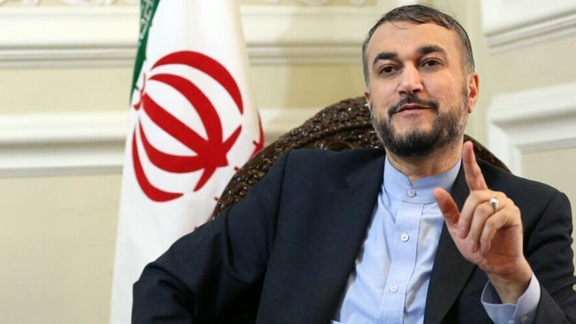Iran Says Biden Must First Show 'Goodwill' Begore Reviving Nuclear Deal

Iran's foreign minister insists that to revive the 2015 nuclear deal, the US must first show "good will" and turn the clock back to 2018 when it left the deal.

Iran's foreign minister insists that to revive the 2015 nuclear deal, the US must first show "good will" and turn the clock back to 2018 when it left the deal.
In an exclusive interview published Sunday by the government mouthpiece, Iran newspaper, the top Iranian diplomat said Tehran expects the US to return to the time before Trump sanctions began, if the President Joe Biden seriously wishes to revive the agreement that his predecessor abandoned. Iran will also return to the same point in the Joint Comprehensive Plan of Action (JCPOA), he said.
Amir-Abdollahian insisted that there is no need for so much negotiation and a "simpler solution" to revive the JCPOA would be if Biden issues an executive order and return to where things were in May 2018.
"We hear [about the US] will and intention [to do so] in their messages but we don't see it in their actions," he said while reiterating that the US should release $10 billion of Iran's frozen funds to prove its "good will", because Iran is very distrustful of their intentions.
A return to 2018 for Iran would mean the lifting of "all Trump sanctions" many of which are not directly or even indirectly related to Iran's nuclear activities. Iran will in return set its nuclear program to the same pace and form as it was in 2018, Iranian officials say. But this fails to take into consideration the different current circumstances including the complexity of the sanctions and the reversal of gains Iran has made in its nuclear program since 2018.
The JCPOA put a 3.65-percent enrichment cap on Iran but since the US withdrawal from the pact, Iran has installed advanced, more powerful centrifuges such allowing it to reach faster and much higher levels of enrichment and has stockpiled 20-percent and 60-percent enriched fissile material that has no civilian use. Iran may retire its advanced centrifuges and give up its stockpile of highly enriched uranium, but it gets to keep the know-how and experience gained in the process.
Arguing that Iran has gained nothing from the JCPOA, including the lifting of UN sanctions in the years following its conclusion, the top Iranian diplomat alleged that former US president Barack Obama was the first one to violate the nuclear deal and that more violations followed by Trump who withdrew from the agreement. He did not specify what had Obama violated.
Iran could say that six UN resolutions against the country had been lifted with a settlement that six other parties to the JCPOA also agreed on and that the issue of sanctions was solved, "if it had benefitted from the agreement", he said, adding: "There is now a thick document in several hundred pages called the JCPOA which has made things even harder for Iran than the six UN resolutions [that it lifted]," he said.
Iran has also insisted that the US gives assurances not to leave the deal if Tehran abides by its commitments. According to a joint statement issued Saturday by Germany, France and the UK Sunday after a meeting on the margins of the G20 in Rome attended by Biden, Angela Merkel, Emmanuel Macron and Boris Johnson, the US president has agreed to return to JCPOA and stay in the deal. “We welcome President Biden’s clearly demonstrated commitment to return the US to full compliance with the JCPOA [joint comprehensive plan of action] and to stay in full compliance, so long as Iran does the same,” the statement said.
But this is a verbal agreement not a ratified treaty and Iran might not satisfied that a future US government would not once again withdraw from the agreement. Once issue with JCPOA, experts have said, is the fact that Obama avoided presenting it for ratification, which made it easier for Trump to abandon the deal.
In his interview with Iran newspaper, Amir-Abdollahian also rejected “excessive demands” by the US and some European countries to include regional issues in negotiations with Iran. "We have no plans to hold talks with them on regional issues,” he said, insisting that talks will be limited to the nuclear issue and the JCPOA.